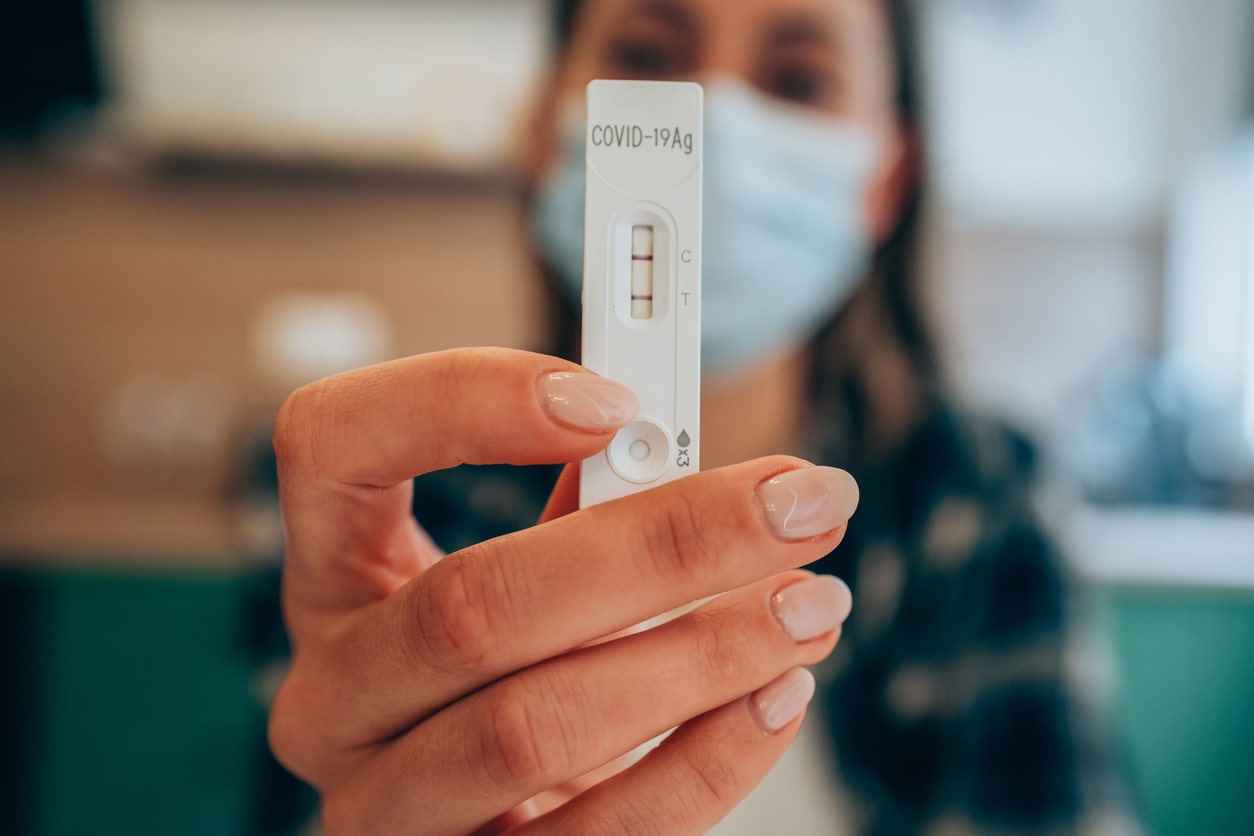If you’ve found an old COVID-19 test kit in your medicine cabinet, you may be wondering: Do expired tests still work? While some tests remain reliable beyond their printed expiration date, others may degrade over time, leading to false negatives or invalid results. Now we’ll review how at-home COVID-19 tests work, when to test, and whether expired kits can still be trusted.
What Are At-Home COVID-19 Tests?
At-home COVID-19 tests are self-administered diagnostic tests that allow you to detect a COVID-19 infection without visiting a healthcare provider. These tests are easy to use and provide rapid results, typically within 15-30 minutes.
Types of At-Home COVID-19 Tests
At-home COVID-19 tests fall into two main categories. Each type has its own advantages and limitations, and understanding the differences can help you choose the best test for your situation. Here are the two types of COVID tests:
Rapid Antigen Tests
Rapid antigen tests detect viral proteins and provide results in 15-30 minutes. A negative COVID test result isn’t always conclusive, so retesting in 24-48 hours is recommended if symptoms persist or after exposure. Due to speed and convenience, rapid antigen COVID tests are widely used for workplace screening, travel, and events.
Molecular (PCR or NAAT) Tests
Molecular tests, such as PCR and NAAT, detect the virus’s genetic material and are more accurate than antigen tests in identifying infections, even before symptoms appear. They are often used to confirm negative antigen results, diagnose high-risk individuals, or meet travel requirements. Most require lab processing, delaying results by 24-72 hours, though some newer versions offer rapid at-home PCR results.
Are At-Home COVID-19 Tests Accurate?
At-home COVID-19 tests are generally reliable, but their accuracy depends on the type of test, timing, and proper usage.
- Rapid Antigen Tests are less sensitive than molecular tests and may produce false negatives, especially early in infection or asymptomatic individuals. They work best when viral load is high, typically within the first few days of symptoms.
- Molecular Tests (PCR or NAAT) are more accurate because they detect genetic material from the virus, identifying infections even at low viral loads. For best accuracy, always follow test instructions carefully.
When Should I Test for COVID-19?
Knowing when to take a COVID-19 test is key to early detection and preventing the spread of the virus. Here are the recommended situations for COVID testing:
- If you develop fever, cough, sore throat, fatigue, or loss of taste/smell, take a COVID-19 test immediately. If your test is negative, retest in 24-48 hours or consider a PCR test if symptoms persist.
- Test at least five days after exposure, even without symptoms, and if negative, retest in 48 hours to confirm results.
- Before visiting high-risk individuals or attending large indoor gatherings, take a test since asymptomatic infections can still spread the virus.
- Some destinations require a negative test before entry, and testing before and after travel helps prevent virus spread, especially if visiting high-risk individuals.
What Do My At-Home COVID-19 Test Results Mean?
Understanding your at-home COVID-19 test results is crucial for taking the appropriate actions to protect yourself and others. Here’s a detailed guide based on information from the Centers for Disease Control and Prevention (CDC):
| Test Result | Meaning | What to Do Next |
| 🟢 Positive COVID-19 Test | A positive at-home COVID-19 test means you likely have or recently had a COVID-19 infection. | – Isolate immediately and follow CDC COVID-19 guidelines. – Notify recent close contacts to help prevent the virus from spreading. – Monitor symptoms and seek medical attention if they worsen. – If high-risk, consult a healthcare provider for possible treatment options like antiviral medications. |
| 🟡 Negative COVID-19 Test | A negative test result means the virus was not detected, but false negatives are possible, especially if you test too early. | If You Have Symptoms: – False negatives can happen, especially early in infection—retest in 24-48 hours. – Consider other illnesses like the flu or RSV and consult a healthcare provider.If You Were Exposed: – Retest 5 days after exposure, even if you have no symptoms. – Continue monitoring for symptoms and follow public health guidelines. |
| 🔴 Invalid COVID-19 Test | An invalid test result means the test did not work properly due to sample collection errors or a defective test kit. | – Retest using a new at-home test kit and carefully follow the instructions. – Ensure proper sample collection for an accurate result. |
Do Expired COVID-19 Tests Work?
An expired COVID-19 test may not provide accurate results because its chemical components, like reagents, can degrade over time, affecting its ability to detect the virus. However, some test manufacturers have extended expiration dates after further stability testing, so you must check the FDA’s expiration date extension list before discarding an expired test.
If a COVID test is past its extended expiration date, it is best to use a new test to ensure reliability. Using an expired COVID test increases the risk of false negatives or invalid results, which could lead to delayed diagnosis and further virus spread.
How to Check If Your Expired COVID-19 Test Is Still Valid
Before throwing away an expired COVID-19 test, you should check if its expiration date has been extended. A COVID test expiration date extension may be granted after stability testing proves the tests remain reliable for long periods. The FDA has approved expiration extensions for many brands, so your test may still be valid even if the printed date has passed.
Step-by-Step Guide: Check Your COVID Test Expiration Date
- Step 1: Find the Brand and Lot Number
Look on the box or instruction manual for the test brand and lot number. - Step 2: Visit the FDA’s Expiration Date Lookup Tool
Go to the FDA’s official list of approved COVID-19 tests. - Step 3: Search for Your Test Brand
Find your test manufacturer on the list and check if the expiration date has been extended. - Step 4: Compare the New Date with Your Test
If the FDA has extended the shelf life, your test may still be safe. If it’s past the new expiration date, it’s best to discard it. - Step 5: When in Doubt, Retest
If you must use an expired test, consider retesting with a newer test or PCR confirmation to ensure accuracy.
COVID-19 Testing in Georgia
At AllCare Georgia, we provide a comprehensive approach to COVID testing with both rapid (antigen) and PCR (send-out) testing available. Our team will ensure you get timely results and help guide you through your COVID diagnosis with care, offering a COVID treatment plan and antiviral medications if appropriate.
We offer a convenient walk-in COVID test in Georgia and no appointment is necessary. Whether you’re looking for a quick COVID test near you or are interested in consulting with one of our primary care physicians, AllCare Georgia makes it easy by offering both under one roof.






